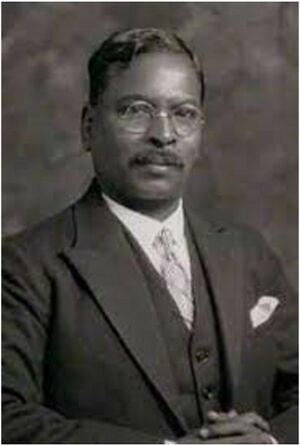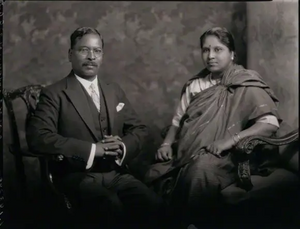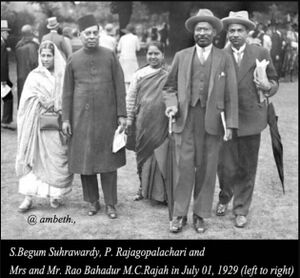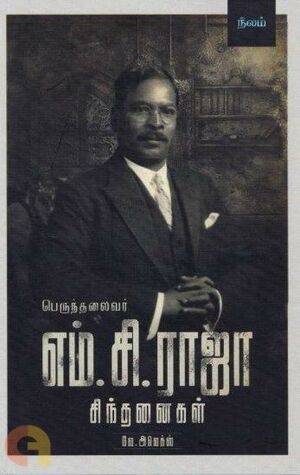M.C. Rajah: Difference between revisions
Lakshman.d (talk | contribs) No edit summary |
(Added First published date) |
||
| (21 intermediate revisions by 5 users not shown) | |||
| Line 1: | Line 1: | ||
[[File:M.C. Raja.jpg|thumb]] | {{Read Tamil|Name of target page=எம்.சி.ராஜா|Title of target page=எம்.சி.ராஜா}} | ||
M.C. Raja (June 17, 1883 - August 20, 1943), Rao Bagadhur Mayilai Chinnathambipillai Raja, is one of the prominent social thinkers of Tamil Nadu, Dalit activist, and | [[File:M.C. Raja.jpg|thumb|M.C. Raja]] | ||
[[File:Home-sri-m-c-rajah.webp|thumb|M.C. Rajah with his wife]] | |||
[[File:M.C. Raja July 01 1929.jpg|thumb|M.C. Rajah]] | |||
M.C. Rajah (June 17, 1883 - August 20, 1943), Rao Bagadhur Mayilai Chinnathambipillai Raja, is one of the prominent social thinkers of Tamil Nadu, Dalit activist, and journalist. | |||
== Birth and Education == | == Birth and Education == | ||
M.C. Rajah was born in Chennai, St. Thomas Mount (Parangimalai) to Mayilai Chinnathambipillai on June 17, 1883. Chinnathambipillai worked as a manager in Lawrence Asylum, Chennai. He attended elementary school at Royapettah Wesley Mission School, high school at Wesley College, and graduated from Madras Christian college. During his time at Wesley College and Madras Christian College(MCC), he was well known for his outstanding cricket skills. He was a beloved student of [[William Miller]], renowned President of Madras Christian College. | |||
== Personal Life == | == Personal Life == | ||
[[ | [[Thiru. V. Kalyansundara mudaliar|Thiru. V. Kalyansundara Mudaliar (Thiru, Vi. Ka)]] had a strong influence on M.C. Raja’s personal life. Both of them lived in Royapettah. The two went to Wesley College together and worked at the same college as teachers. M.C. Rajah was then appointed supervisor of the first to fifth grade of elementary school in Wesley College. Thiru. V. Kalyansundara Mudaliar worked as a Tamil professor. In 1916, M.C. Rajah joined the Justice Party and became involved in serious politics. Thiru. V. Kalyansundara Mudaliar supported Congress party. Thiru. V. Kalynasundara Mudaliar started the magazine ''Desabakthan'' (Patriot) and planned to resign from his job at the college. M.C. Rajah advised not to leave college, but Thiru. V. Kalyansundara Mudaliar ignored his advice. | ||
After graduation, M.C. Rajah became a teacher at Wesley College. M.C. Rajah has written books for schools and academies, which were primarily used by schools in the Madras region. M.C. Rajah was appointed a member of an elementary school council formed by Governor Lord Bernland in 1917. In 1919, he was a member of the general committee that drafted the elementary education bill. He also served on the committee that reforms higher education. He was also involved in the Scout movement. | |||
After graduation, M.C. | |||
== Political Life == | == Political Life == | ||
M.C. | M.C. Rajah’s father Mayilai Chinnathambi pillai worked as a secretary in Adidravida Jana Sabha. During his student years, M.C. Rajah joined the politics association of his father. After his father, in 1916, M.C. Rajah was appointed as a General Secretary of Adidravida Jana Sabha. M.C. Rajah gained national attention with his group petition to Montagu-Chelmsford Reforms committee to support the rights of the depressed class. M.C. Rajah was also appointed as State Legislative assembly member in 1919. He continued to serve as a member in 1921, 1925, and 1926. | ||
M.C. | M.C. Rajah supported the Justice Party. In 1921, the King of Panagal of the Justice Party introduced reservation for the people of oppressed classes. M.C. Rajah opposed and protested against the initiative because it did not provide reservation for scheduled groups. A riot broke out in Puliyanthoppu, Chennai as a result of the protest. Justice Party blamed and took action against Dalit community for the riot. As a result of this, M.C. Rajah left the Justice party in 1923. | ||
M.C. Rajah was bestowed the title of Rao Bahadur by the British Government in 1922. M.C. Rajah met with Chennai Governor Wellington, Governor General Redding in 1923, and Goshen in 1925 to discuss the importance of giving preference to the oppressed class. More than 500 public meetings were held in Delhi by M.C. Rajah and more than 100 conferences were held to promote the agenda and bring together depressed classes. In 1926, he became the founding member and first secretary of All India Depressed Classes Association in Nagpur. Ambedkar held the position of joint secretary. | |||
In 1930, he became a member of Parliament. He was one of the first Dalits to represent | In 1930, he became a member of Indian Parliament. He was one of the first Dalits to represent the community in the parliament. In 1922, he passed a resolution to legally name Paraiyar as Adidravidar and Panjamar as Adiandirar. He served as speaker of parliament for one term in 1934. In 1933, he passed a parliamentary bill to legally abolish untouchability. However, it was unanimously rejected. | ||
Between April and July of 1937, he served as Development Minister in the State government temporarily formed by Kurma Venkatareddy Naidu. | Between April and July of 1937, he served as Development Minister in the State government temporarily formed by Kurma Venkatareddy Naidu. | ||
[[File:Mc-raja-sinthanaigal FrontImage 478.jpg|thumb|M.C. Rajah Sindhanaigal]] | |||
== | ====== Rajah Moonje Pact ====== | ||
In 1922, M.C. | In 1922, M.C. Rajah made an agreement with Indian National Congress’s leftist Dr. P. S. Moonje and Jadhav. As per the agreement, Rajah was to support them in Parliament and they must arrange for reservation of depressed classes. Empowered by this arrangement Ambedkar demanded reservation of constituencies for depressed classes in elections. | ||
====== Conflict with Ambedkar ====== | |||
== Conflict with Ambedkar == | M.C. Rajah was a pioneer to fight for Indian Dalit community even before Ambedkar. M.C. Rajah did not have the opportunity to take part in the round table conferences held in 1930. Rettaimalai Srinivasan and Ambedkar were given the opportunity. The conflict between Rajah and Ambedkar resulted from this exclusion. In the discussion related to double voting privilege, M.C. Rajah welcomed the initiative, but Ambedkar had resisted. Ambedkar accepted the initiative after the round table conference, but Rajah resisted it because of the incidents taking place all over the country. It became a direct political rift between them. In 1942, M.C. Rajah participated in Ambedkar’s birthday event in Pune and then both of them worked together in Cripps Mission. | ||
M.C. | == Literary Life == | ||
M.C. Rajah has written several books for academics. Collaborating with R. Ranganaygi Ammal, both of them co-wrote the children’s book called, Kindergarten Room. Third edition of this book was published in 1930. | |||
== | |||
M.C. | |||
== Death == | == Death == | ||
He died on August 23, 1945, at his house in Raja street, St. Thomas Mount, Chennai. | He died on August 23, 1945, at his house in Raja street, St. Thomas Mount, Chennai. | ||
== Books == | == Books == | ||
* Jain Meeanakshi, Rajah-Moonje Pact: Documents On A Forgotten Chapter Of Indian History (with Devendra Svarupa, Low Price Publishers, 2007), ISBN 8184540787. | |||
* Jain Meeanakshi, Rajah-Moonje Pact: Documents On A Forgotten Chapter Of Indian History (with Devendra Svarupa, Low Price Publishers, 2007), | |||
* Rajah, M. C. (1939). Independence Without, Freedom Within: Speech of Rao Bahadur M.C. Rajah, M.L.A., at the Madras Legislative Assembly on the 26th October 1939 on the Congress Resolution on India and the War | * Rajah, M. C. (1939). Independence Without, Freedom Within: Speech of Rao Bahadur M.C. Rajah, M.L.A., at the Madras Legislative Assembly on the 26th October 1939 on the Congress Resolution on India and the War | ||
* An unforgettable Dalit voice: life, writings, and speeches of M.C. Rajah by M. C Rajah | * An unforgettable Dalit voice: life, writings, and speeches of M.C. Rajah by M. C Rajah | ||
| Line 44: | Line 35: | ||
* King George V for pupils in high schools and colleges | * King George V for pupils in high schools and colleges | ||
* The life, select writings and speeches of Rao Bahadur M.C. Rajah | * The life, select writings and speeches of Rao Bahadur M.C. Rajah | ||
* Odukapatta Hindukkal | * ''Odukapatta Hindukkal'' | ||
* Perunthalaivar M.C. | * ''Perunthalaivar M.C. Rajah Sinthanaigal Thoguppu'' - Ve. Alex | ||
* Ilainjar Thavaranool ( | * ''Ilainjar Thavaranool'' (Textbook) | ||
* Kindergarten Kalvi ( | * ''Kindergarten Kalvi'' (Textbook) | ||
* Edward Ilavarasar ( | * ''Edward Ilavarasar'' (Textbook) | ||
* Ilakkana Padangal ( | * ''Ilakkana Padangal'' (Textbook) | ||
== References == | |||
== | * Perunthalaivar M.C. Rajah Sinthanaigal Thoguppu - Ve. Alex | ||
* Perunthalaivar M.C. | |||
* [https://www.keetru.com/kavithaasaran/jul06/mc_raja.php Undeserved Hindus] | * [https://www.keetru.com/kavithaasaran/jul06/mc_raja.php Undeserved Hindus] | ||
* [https://www.jeyamohan.in/5516/ M.C. Raja, Forgotten leader in history - Jeyamohan] | * [https://www.jeyamohan.in/5516/ M.C. Raja, Forgotten leader in history - Jeyamohan] | ||
* [https://www.hindutamil.in/news/opinion/columns/231825-.html M.C. Raja, Yet another hidden Tamil leader - hindutamil.in] | * [https://www.hindutamil.in/news/opinion/columns/231825-.html M.C. Raja, Yet another hidden Tamil leader - hindutamil.in] | ||
* [https://swarajyamag.com/politics/rajah-moonje-pact-the-forgotten-model-for-social-justice-and-integration-of-dalits Rajah-Moonje Pact: The Forgotten Model For Social Justice And Integration Of Dalits] | * [https://swarajyamag.com/politics/rajah-moonje-pact-the-forgotten-model-for-social-justice-and-integration-of-dalits Rajah-Moonje Pact: The Forgotten Model For Social Justice And Integration Of Dalits] | ||
* [https://gsannah.wordpress.com/2013/02/20/mcraja-dalit-histor/ M.C. | * [https://gsannah.wordpress.com/2013/02/20/mcraja-dalit-histor/ M.C. Rajah - Forgotten legacy - Ja. Gowtama Sanna] | ||
* [https://cisindus.org/2021/05/29/who-was-m-c-rajah/ Who Was M.C.Rajah?- | * [https://cisindus.org/2021/05/29/who-was-m-c-rajah/ Who Was M.C.Rajah?-Centric for Indic Ctudies] | ||
* [https://vsktamilnadu.org/article/freedom-75-shri-mc-rajah-the-unsung-hero-of-social-justice-hindu-unity/ Freedom 75: Shri MC Rajah, The Unsung Hero Of Social Justice & Hindu Unity] | * [https://vsktamilnadu.org/article/freedom-75-shri-mc-rajah-the-unsung-hero-of-social-justice-hindu-unity/ Freedom 75: Shri MC Rajah, The Unsung Hero Of Social Justice & Hindu Unity] | ||
{{Finalised-en}} | |||
{{Fndt-en|11-Oct-2022, 08:51:26 IST}} | |||
[[Category:English Content]] | |||
Latest revision as of 16:27, 13 June 2024
இந்தப் பக்கத்தை தமிழில் வாசிக்க: எம்.சி.ராஜா
M.C. Rajah (June 17, 1883 - August 20, 1943), Rao Bagadhur Mayilai Chinnathambipillai Raja, is one of the prominent social thinkers of Tamil Nadu, Dalit activist, and journalist.
Birth and Education
M.C. Rajah was born in Chennai, St. Thomas Mount (Parangimalai) to Mayilai Chinnathambipillai on June 17, 1883. Chinnathambipillai worked as a manager in Lawrence Asylum, Chennai. He attended elementary school at Royapettah Wesley Mission School, high school at Wesley College, and graduated from Madras Christian college. During his time at Wesley College and Madras Christian College(MCC), he was well known for his outstanding cricket skills. He was a beloved student of William Miller, renowned President of Madras Christian College.
Personal Life
Thiru. V. Kalyansundara Mudaliar (Thiru, Vi. Ka) had a strong influence on M.C. Raja’s personal life. Both of them lived in Royapettah. The two went to Wesley College together and worked at the same college as teachers. M.C. Rajah was then appointed supervisor of the first to fifth grade of elementary school in Wesley College. Thiru. V. Kalyansundara Mudaliar worked as a Tamil professor. In 1916, M.C. Rajah joined the Justice Party and became involved in serious politics. Thiru. V. Kalyansundara Mudaliar supported Congress party. Thiru. V. Kalynasundara Mudaliar started the magazine Desabakthan (Patriot) and planned to resign from his job at the college. M.C. Rajah advised not to leave college, but Thiru. V. Kalyansundara Mudaliar ignored his advice. After graduation, M.C. Rajah became a teacher at Wesley College. M.C. Rajah has written books for schools and academies, which were primarily used by schools in the Madras region. M.C. Rajah was appointed a member of an elementary school council formed by Governor Lord Bernland in 1917. In 1919, he was a member of the general committee that drafted the elementary education bill. He also served on the committee that reforms higher education. He was also involved in the Scout movement.
Political Life
M.C. Rajah’s father Mayilai Chinnathambi pillai worked as a secretary in Adidravida Jana Sabha. During his student years, M.C. Rajah joined the politics association of his father. After his father, in 1916, M.C. Rajah was appointed as a General Secretary of Adidravida Jana Sabha. M.C. Rajah gained national attention with his group petition to Montagu-Chelmsford Reforms committee to support the rights of the depressed class. M.C. Rajah was also appointed as State Legislative assembly member in 1919. He continued to serve as a member in 1921, 1925, and 1926.
M.C. Rajah supported the Justice Party. In 1921, the King of Panagal of the Justice Party introduced reservation for the people of oppressed classes. M.C. Rajah opposed and protested against the initiative because it did not provide reservation for scheduled groups. A riot broke out in Puliyanthoppu, Chennai as a result of the protest. Justice Party blamed and took action against Dalit community for the riot. As a result of this, M.C. Rajah left the Justice party in 1923.
M.C. Rajah was bestowed the title of Rao Bahadur by the British Government in 1922. M.C. Rajah met with Chennai Governor Wellington, Governor General Redding in 1923, and Goshen in 1925 to discuss the importance of giving preference to the oppressed class. More than 500 public meetings were held in Delhi by M.C. Rajah and more than 100 conferences were held to promote the agenda and bring together depressed classes. In 1926, he became the founding member and first secretary of All India Depressed Classes Association in Nagpur. Ambedkar held the position of joint secretary.
In 1930, he became a member of Indian Parliament. He was one of the first Dalits to represent the community in the parliament. In 1922, he passed a resolution to legally name Paraiyar as Adidravidar and Panjamar as Adiandirar. He served as speaker of parliament for one term in 1934. In 1933, he passed a parliamentary bill to legally abolish untouchability. However, it was unanimously rejected.
Between April and July of 1937, he served as Development Minister in the State government temporarily formed by Kurma Venkatareddy Naidu.
Rajah Moonje Pact
In 1922, M.C. Rajah made an agreement with Indian National Congress’s leftist Dr. P. S. Moonje and Jadhav. As per the agreement, Rajah was to support them in Parliament and they must arrange for reservation of depressed classes. Empowered by this arrangement Ambedkar demanded reservation of constituencies for depressed classes in elections.
Conflict with Ambedkar
M.C. Rajah was a pioneer to fight for Indian Dalit community even before Ambedkar. M.C. Rajah did not have the opportunity to take part in the round table conferences held in 1930. Rettaimalai Srinivasan and Ambedkar were given the opportunity. The conflict between Rajah and Ambedkar resulted from this exclusion. In the discussion related to double voting privilege, M.C. Rajah welcomed the initiative, but Ambedkar had resisted. Ambedkar accepted the initiative after the round table conference, but Rajah resisted it because of the incidents taking place all over the country. It became a direct political rift between them. In 1942, M.C. Rajah participated in Ambedkar’s birthday event in Pune and then both of them worked together in Cripps Mission.
Literary Life
M.C. Rajah has written several books for academics. Collaborating with R. Ranganaygi Ammal, both of them co-wrote the children’s book called, Kindergarten Room. Third edition of this book was published in 1930.
Death
He died on August 23, 1945, at his house in Raja street, St. Thomas Mount, Chennai.
Books
- Jain Meeanakshi, Rajah-Moonje Pact: Documents On A Forgotten Chapter Of Indian History (with Devendra Svarupa, Low Price Publishers, 2007), ISBN 8184540787.
- Rajah, M. C. (1939). Independence Without, Freedom Within: Speech of Rao Bahadur M.C. Rajah, M.L.A., at the Madras Legislative Assembly on the 26th October 1939 on the Congress Resolution on India and the War
- An unforgettable Dalit voice: life, writings, and speeches of M.C. Rajah by M. C Rajah
- The oppressed Hindus by M. C Rajah
- King George V for pupils in high schools and colleges
- The life, select writings and speeches of Rao Bahadur M.C. Rajah
- Odukapatta Hindukkal
- Perunthalaivar M.C. Rajah Sinthanaigal Thoguppu - Ve. Alex
- Ilainjar Thavaranool (Textbook)
- Kindergarten Kalvi (Textbook)
- Edward Ilavarasar (Textbook)
- Ilakkana Padangal (Textbook)
References
- Perunthalaivar M.C. Rajah Sinthanaigal Thoguppu - Ve. Alex
- Undeserved Hindus
- M.C. Raja, Forgotten leader in history - Jeyamohan
- M.C. Raja, Yet another hidden Tamil leader - hindutamil.in
- Rajah-Moonje Pact: The Forgotten Model For Social Justice And Integration Of Dalits
- M.C. Rajah - Forgotten legacy - Ja. Gowtama Sanna
- Who Was M.C.Rajah?-Centric for Indic Ctudies
- Freedom 75: Shri MC Rajah, The Unsung Hero Of Social Justice & Hindu Unity
✅Finalised Page
First published on:
11-Oct-2022, 08:51:26 IST




